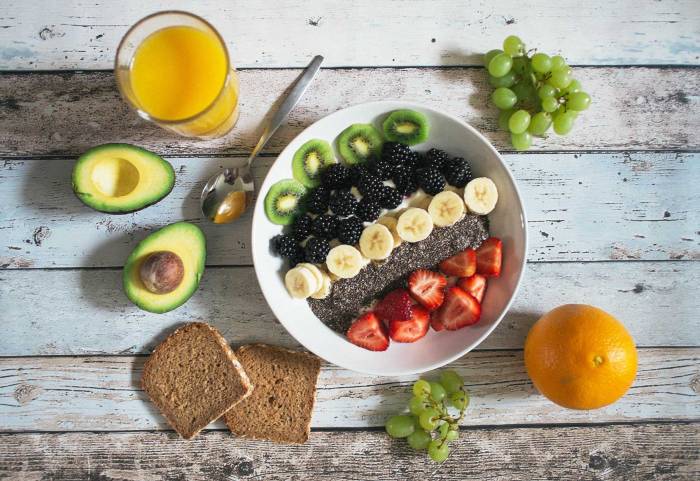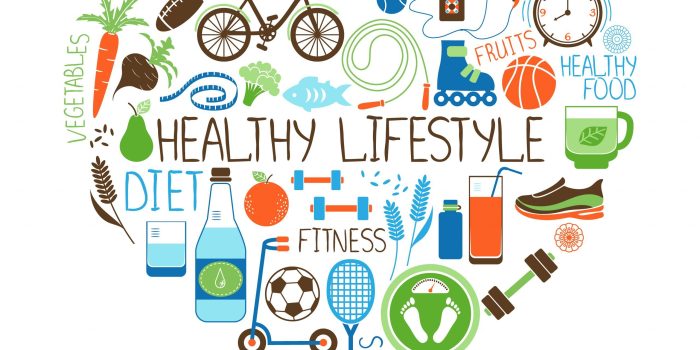With Healthy Eating Habits at the forefront, this paragraph opens a window to an amazing start and intrigue, inviting readers to embark on a storytelling journey filled with unexpected twists and insights.
Eating right ain’t just about the food—it’s a lifestyle. From boosting your mood to preventing diseases, healthy eating habits have a lot to offer. Let’s dive into the world of nutritious choices and balanced diets!
Benefits of Healthy Eating Habits
Eating a nutritious diet has numerous benefits that contribute to overall well-being. By fueling our bodies with the right nutrients, we can maintain a healthy weight, boost our energy levels, and improve our immune system.
Essential Nutrients for a Healthy Diet
- Protein: essential for building and repairing tissues in the body.
- Fiber: aids in digestion and helps to prevent constipation.
- Vitamins and minerals: play crucial roles in various bodily functions and processes.
Prevention of Chronic Diseases
- A diet high in fruits, vegetables, and whole grains can reduce the risk of heart disease and stroke.
- Limiting the intake of processed foods and sugary beverages can help prevent obesity and type 2 diabetes.
- Consuming foods rich in antioxidants can lower the risk of certain cancers.
Link Between Balanced Diet and Mental Health
Eating a well-rounded diet can have a positive impact on mental health. Nutrient-rich foods can help regulate mood, reduce stress, and improve cognitive function. A balanced diet can also support brain health and reduce the risk of mental health disorders.
Building Healthy Eating Habits

Eating a balanced diet is crucial for maintaining overall health and well-being. Meal planning plays a significant role in ensuring you get the right nutrients your body needs to function at its best.
Meal Planning for a Balanced Diet
Meal planning involves preparing a weekly menu that includes a variety of foods from different food groups. This helps ensure you are getting a good mix of nutrients and prevents you from making unhealthy food choices on a whim.
- Include a mix of lean proteins, whole grains, fruits, vegetables, and healthy fats in your meals.
- Plan your meals ahead of time and make a grocery list to avoid impulse buys.
- Cook in batches and freeze individual portions for easy grab-and-go meals during busy days.
Incorporating More Fruits and Vegetables
Adding more fruits and vegetables to your daily meals can boost your intake of essential vitamins, minerals, and fiber.
- Keep a bowl of fresh fruit on your kitchen counter for easy snacking.
- Add vegetables to dishes like omelets, soups, and stir-fries to increase your daily intake.
- Experiment with different cooking methods like roasting, grilling, or steaming to enhance flavors.
Importance of Portion Control
Controlling your portion sizes is key to maintaining a healthy weight and preventing overeating.
- Use smaller plates and bowls to help control portion sizes without feeling deprived.
- Practice mindful eating by paying attention to hunger and fullness cues to avoid overeating.
- Measure out serving sizes of snacks and treats to prevent mindless munching.
Avoiding Processed Foods and Sugary Drinks, Healthy Eating Habits
Processed foods and sugary drinks are often high in unhealthy fats, added sugars, and preservatives, which can contribute to weight gain and chronic health issues.
- Read food labels and choose whole, minimally processed foods whenever possible.
- Swap sugary drinks for water, herbal teas, or infused water for a healthier alternative.
- Prepare meals at home using fresh ingredients to have better control over what goes into your food.
Healthy Eating for Different Lifestages

Eating healthy is crucial at every stage of life to support overall well-being and vitality. Nutritional needs vary across different lifestages, from childhood to old age, each requiring specific attention to ensure optimal health and development.
Nutritional Needs During Childhood
During childhood, it is essential to focus on nutrient-dense foods to support growth and development. Children need adequate amounts of protein, calcium, iron, and vitamins to ensure proper bone, muscle, and brain development. Encouraging a variety of fruits, vegetables, whole grains, and lean proteins can help meet their nutritional needs.
Nutritional Needs During Adolescence
Adolescents experience rapid growth and changes in their bodies, requiring increased amounts of nutrients such as calcium, iron, and vitamin D. It is important to emphasize a balanced diet that includes plenty of fruits, vegetables, whole grains, and lean proteins to support their energy levels, immune function, and overall health.
Nutritional Needs During Adulthood
In adulthood, maintaining a healthy diet becomes crucial for preventing chronic diseases and promoting longevity. Adults should focus on consuming nutrient-rich foods such as whole grains, lean proteins, healthy fats, and plenty of fruits and vegetables. Paying attention to portion sizes and staying hydrated are also key components of a healthy diet.
Nutritional Needs During Old Age
As individuals age, their metabolism slows down, and nutrient absorption may decrease. Older adults should prioritize foods rich in fiber, calcium, vitamin D, and B vitamins to support bone health, cognitive function, and overall well-being. Adequate hydration and regular physical activity are also important for maintaining good health in old age.
Dietary Adjustments During Pregnancy and Lactation
Pregnancy and lactation are critical periods that require additional nutrients to support the growth and development of the baby. Women should focus on consuming foods high in folate, iron, calcium, and omega-3 fatty acids to ensure a healthy pregnancy and breastfeeding experience. It is essential to consult with a healthcare provider for personalized dietary recommendations during this time.
Tips for Maintaining a Healthy Diet While Following a Vegetarian or Vegan Lifestyle
Following a vegetarian or vegan lifestyle can be healthy if well-planned to ensure adequate intake of essential nutrients. Tips for maintaining a healthy plant-based diet include incorporating a variety of fruits, vegetables, legumes, whole grains, nuts, and seeds to meet nutrient needs such as protein, iron, calcium, vitamin B12, and omega-3 fatty acids. It is important to be mindful of food choices and consider supplementation if necessary.
Insights on Managing Dietary Restrictions or Food Allergies
Managing dietary restrictions or food allergies requires careful attention to food labels, meal preparation, and cross-contamination. Individuals with specific dietary needs should focus on whole, unprocessed foods and communicate their dietary requirements when dining out or attending social gatherings. Seeking guidance from a healthcare professional or dietitian can help create a balanced and safe eating plan tailored to individual needs.
Impact of Healthy Eating on Physical Fitness
Eating a nutritious diet plays a crucial role in enhancing physical fitness and athletic performance. Proper nutrition provides the body with the necessary fuel to perform at its best during workouts and activities.
Relationship between Nutrition and Athletic Performance
- Consuming a balanced diet rich in carbohydrates, proteins, healthy fats, vitamins, and minerals can improve endurance, strength, and overall performance.
- Proper nutrition helps in muscle repair and recovery after intense exercise sessions, reducing the risk of injury and enhancing muscle growth.
- Adequate intake of water and electrolytes maintains hydration levels, crucial for optimal physical performance.
Pre and Post-Workout Meals for Optimal Results
- Pre-workout meal: A combination of carbohydrates and protein, such as a banana with almond butter or Greek yogurt with berries, can provide energy and support muscle function during exercise.
- Post-workout meal: Including protein for muscle repair and carbohydrates for replenishing energy stores, like a chicken and quinoa salad or a smoothie with protein powder and fruits, aids in recovery and muscle recovery.
Tips for Fueling the Body Before and After Exercise
- Consume a balanced meal 2-3 hours before a workout to ensure proper digestion and energy availability.
- Stay hydrated before, during, and after exercise to maintain performance and prevent dehydration.
- Include snacks like nuts, fruits, or protein bars for quick energy boosts before and after workouts.
Role of Hydration in Supporting Physical Activities
- Hydration is essential for regulating body temperature, lubricating joints, and transporting nutrients throughout the body during physical activities.
- Dehydration can lead to decreased performance, fatigue, and muscle cramps, emphasizing the importance of staying hydrated before, during, and after workouts.
- Water is the best choice for hydration, but electrolyte-rich drinks can be beneficial for intense or prolonged exercise sessions.